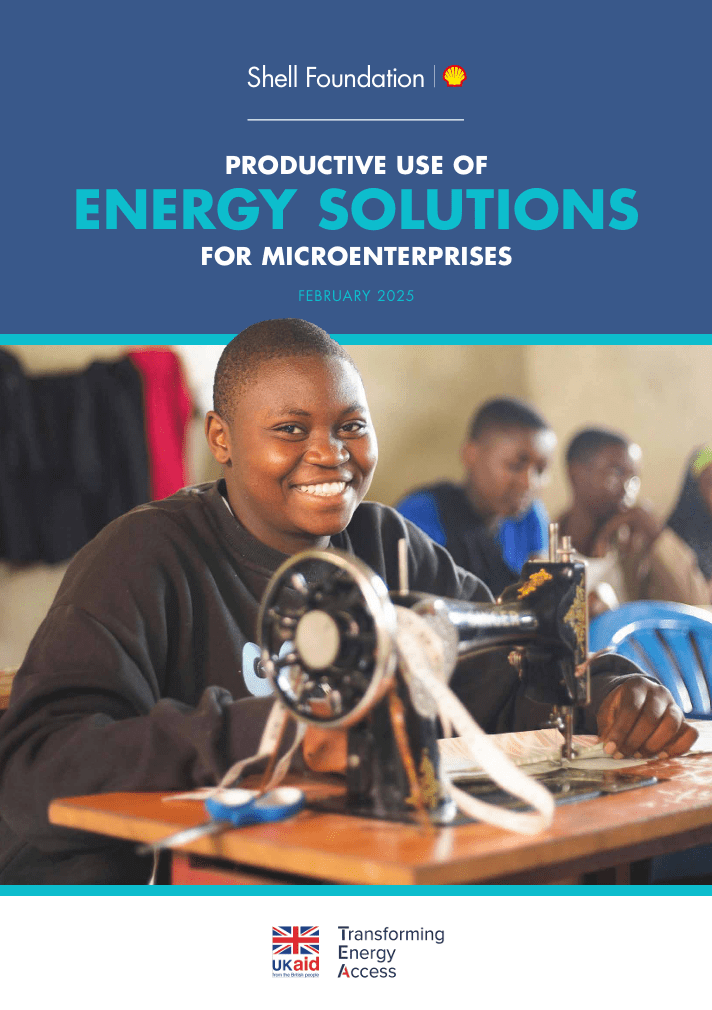Productive Use of Energy Solutions fo Microenterprises
 |
rapport Feb 2025 ; 94 pages
Aut. André Troost & Sam Duby & Kelvin Kamande & Nichola Richards
Ed. SHELL - London
Téléchargeable sous format: PdF
Téléchargeable chez l'éditeur
Résumé:
Les usages productifs de l’énergie (PUE) sont devenus un point central pour les praticiens de l’accès à l’énergie, les gouvernements, les investisseurs et les donateurs ces dernières années, qui cherchent à combler les lacunes existantes entre l’accès à l’énergie et l’activité économique dans les populations mal desservies.
L’irrigation et l’agro-transformation ont souvent été mises en avant comme des exemples d’application des solutions PUE pour résoudre les défis du secteur agricole. Toutefois, il est possible d’élargir cette perspective à d’autres domaines d’utilisation ayant un impact significatif sur l’augmentation des revenus d’un large éventail d’utilisateurs.
Ce rapport explore le paysage complexe des solutions PUE moins documentées, en analysant leur impact sur les microentreprises en Inde, au Kenya et au Nigeria. Les conclusions du rapport s’appuient sur une base de données de marché couvrant 153 fournisseurs et proposent des solutions pratiques pour les parties prenantes visant à faciliter une adoption exponentielle des technologies PUE. Abstract:
Productive uses of energy (PUE) have become a focal point for energy access practitioners, governments, investors and donors in recent times as stakeholders seek to address the gaps that exist between energy access and economic activity in underserved populations.
Much has been written about irrigation and agro-processing and the application of certain PUE solutions to address problems faced in the agriculture sector. However, there is an opportunity to extend the focus beyond these applications to other use cases that are impactful in increasing incomes for a wide range of users.
This report delves into th compelx landscape of less documented PUE solutions, analysing their impact on microenterprises in India, Kenya, and Nigeria. The findings of the report are based on a market database covering 153 suppliers and suggest practical resolutions for stakeholders aiming to facilitate exponential increases in the adoption of PUE technologies. Contents:
1. Introduction 11
1.1 The value proposition of productive uses of energy 13
1.2 Introduction to microenterprises 13
1.3 Study methodology 14
2. Exploring PUE sectors 15
2.1 Cooling 22
2.2 Food and beverage preparation 24
2.3 Metalwork 26 2.4 Carpentry 27
2.5 Textiles 28 2.6 ICT 29
2.7 Animal husbandry 30
2.8 Cottage industries (India focus) 31
2.9 Hairdressing and barbershops (Kenya and Nigeria focus) 33
3. India PUE landscape 34
4. Kenya PUE landscape 41
5. Nigeria PUE landscape 50
6. Common challenges faced by PUE suppliers 58
6.1. Affordability of PUE solutions 60
6.2 Access to finance 63
6.3 Lack of data and digital systems 67
6.4 The high cost of serving hard-to-reach customers 68
6.5 Procurement inefficiencies 69
6.6 Consumer awareness 69
6.7 Poor product market fit 70
6.8 Limited market access among microenterprises 70
6.9 Regulations impeding the sector 71
7. Resolutions for root causes of challenges 74
7.1 Bulk purchasing and warehousing facilities to tackle market fragmentation 75
7.2 Bridge the funding mismatch between suppliers and funders 79 7.3 Subsidies and consumer (demand side) finance to address affordability 85
7.4 Building consumer awareness 86
7.5 Interventions to increase microenterprises’ market access 88
7.6 Technical assistance for PUE supplier business development 89
7.7 Improving last mile connectivity 91
7.8 Financial and non-financial support to target structural gender-specific barriers 92
Public-Cible:
Mots clefs: |
accès à l'énergie (CI) (DT) (OP) (ope) , entreprises (CI) (DT) (OP) (ope) , usage productif (CI) (DT) (OP) (ope) |
Pays concernés: |
Inde (CI) (DT) (OP) , Kenya (CI) (DT) (OP) , Nigeria (CI) (DT) (OP) |
Editeur/Diffuseur: |
|
SHELL
-
Shell Foundation - London - Royaume Uni |
En cas de lien brisé, nous le mentionner à communication@pseau.org